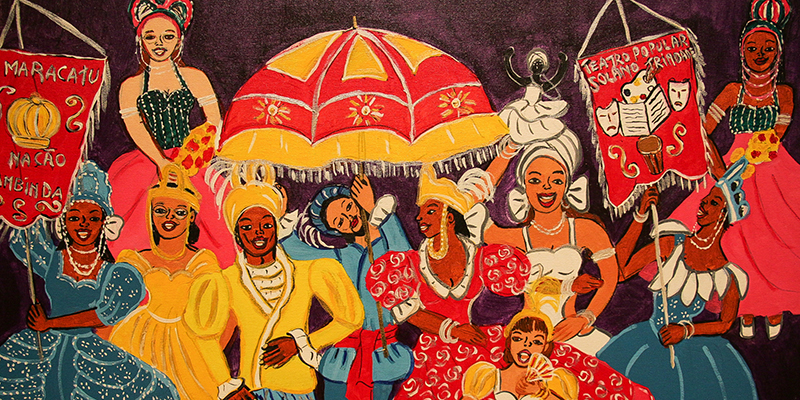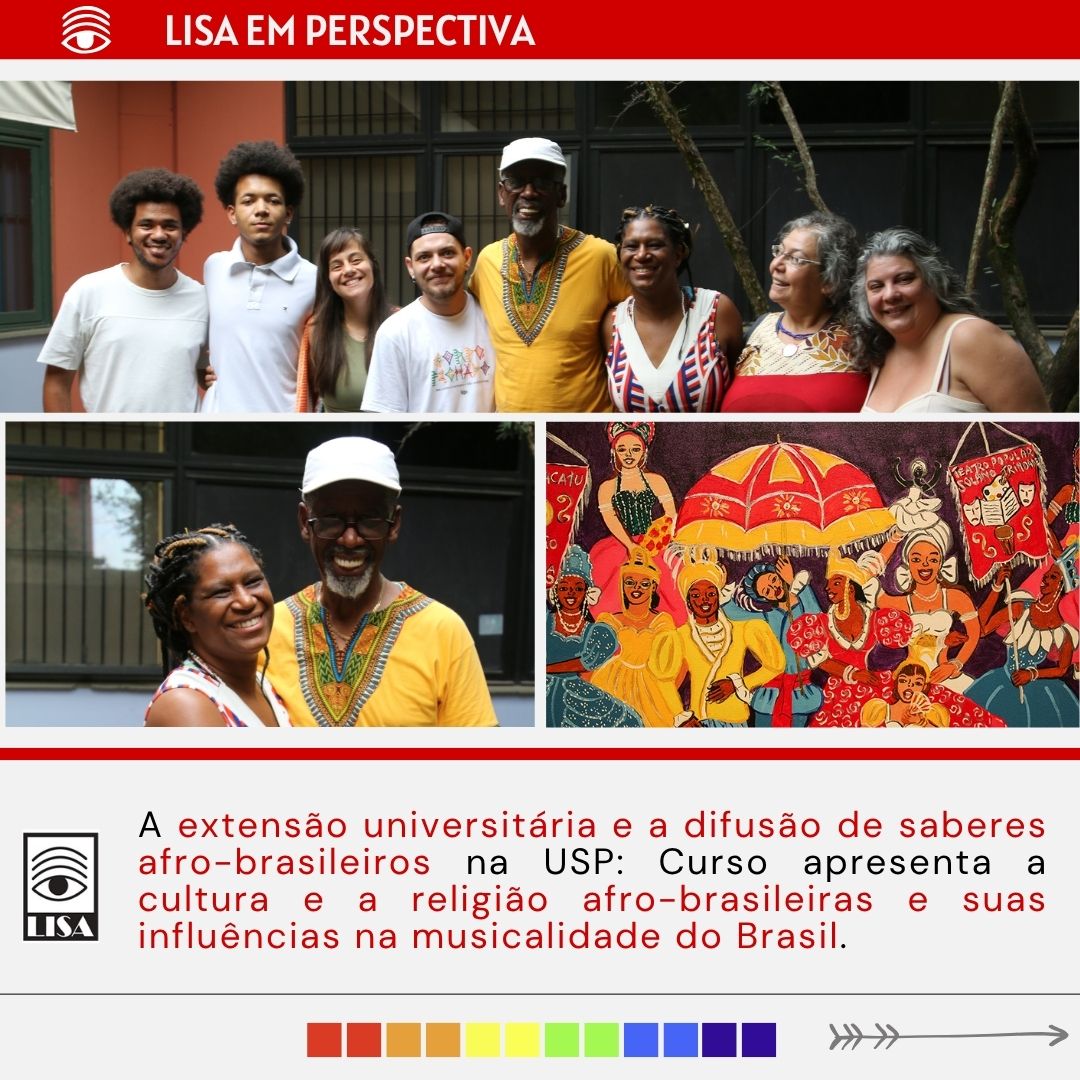Authorship: Maykon Cruz Almeida • LISA Scientific Journalism Scholarship
Art/Dissemination: Carlos Eduardo Conceição • LISA Scientific Dissemination Scholarship
Reviews: Rose Satiko • LISA Coordinator | Vanessa Munhoz • LISA Communication
Published: 06/03/2025
How can the university approach Afro-Brazilian knowledge? How can we understand and spread the influence of Afro-Brazilian cultural practices in areas such as music, dance, and theater? Cultural and extension activities are one of the three pillars of university life. Alongside research and teaching, extension activities are fundamental for dialogue between academia and society. Through teaching programs, outreach, and other related activities, the university can maintain and strengthen its connection with various social segments, with predominantly interdisciplinary activities that can take place outside classrooms and laboratories.
Afro-Brazilian thought is the theme of the culture and extension course The Path of the Alabê – Rhythms of the Orixás and Brazilian Music, which has been promoted annually since 2023 by the Image and Sound Anthropology Laboratory (LISA-USP).
The latest edition of the course took place from September 12 to November 14, 2024, in partnership with the Teatro Popular Solano Trindade (TPST). Classes were taught by Vítor da Trindade, musician, master in ethnomusicology from the School of Communications and Arts (ECA) of the University of São Paulo (USP), and director of TPST, and by Elis Sibere dos Santos Monte Trindade de Souza, Afro-Brazilian dance teacher, choreographer, and cultural coordinator at TPST, under the coordination of Rose Satiko Gitirana Hikiji, associate professor in the Department of Anthropology at USP (DA-USP), and coordinator of both LISA and the USP Center for Afro-Brazilian Arts.
The course addressed the rhythms of the orixás, dances, music, corporeality, manifestations, and their influences on Brazilian musicality. As an outreach activity, the course reinforces the university’s role in opening itself to various sectors of society, providing support for the implementation and strengthening of diversity and inclusion initiatives and compliance with Law 10.639/03, which mandates the teaching of “Afro-Brazilian History and Culture” in schools across the country. It broadens the scope of university activities and positions them as a means to value African and Afro-Brazilian cultural heritage.
According to Vítor da Trindade, “the course emerged from the need to make known the profession of the Ogan as a priest who holds knowledge about the drums of the Orixás and the Candomblé ritual. Due to the lack of awareness and erasure of this professional, especially regarding their profound influence on Brazilian music as a whole.” According to him, the course activities aim to respectfully discuss our ancestry and the possible future of a religion that reflects Black communities in their work, leisure, and family relationships.
Culture and Outreach
Despite the current gaps in the implementation of extension activities, their origin dates back to the second half of the 19th century. In 1871, the University of Cambridge in England was possibly the first to formally implement extension courses taught by faculty members. In 1988, by establishing the Dean’s Office for Culture and Extension, the University of São Paulo advanced in integrating outreach into the institution and the broader Brazilian context. Even though the word “culture” was removed—unlike the 1934 Foundation Statute and the 1969 Statute—the creation of the dean’s office marked a moment of increased attention and dedication to these activities that contribute to the development of university-society relations by “extending to society services that are inseparable from teaching and research,” as emphasized in the 1988 Statute.
On this subject, in the article Culture and Outreach as Motivation for University Activity, Adilson Avansi de Abreu, USP’s Dean for Culture and Extension from 1997 to 2005, stated: “The university is, therefore, above all, an institution focused on culture, in all its forms of manifestation embodied in knowledge and the professional formations derived from it.” Thus, it is also a vehicle for the dissemination of subalternized cultures and knowledge, with the university presenting itself as an open hub for access to other cultures.
University Outreach as a Promoter of Afro-Brazilian Heritage and Ancestral Knowledge
Heir to the legacy of the Solano Trindade family, Vítor da Trindade is the son of Raquel Trindade—also known artistically as A Kambinda—a painter, writer, essayist, choreographer, carnival artist, who in 1974, after the death of her father, founded TPST, continuing the legacy of the Teatro Popular Brasileiro (TPB), created by Solano Trindade in the 1950s. Solano, Vítor’s grandfather, was a prominent figure in Afro-Brazilian literature and a multi-artist who acted as a poet, actor, playwright, painter, promoter of popular culture, and activist in the Black Movement and the Communist Party. His wife, Maria Margarida da Trindade, was a choreographer, occupational therapist, collaborator of psychiatrist Nise da Silveira, and co-founder of TPB.

In addition to being a political and social activist, Raquel Trindade was a pioneer in implementing extension courses at the University of Campinas (Unicamp). Invited to teach courses on Black Theater in Brazil and Religious Syncretism, she proposed opening the course to staff and the broader community after seeing only one Black student enrolled. This led to a large group of Black artists joining the class. According to Vítor, “from this extension course emerged Urucungos Puítas e Quijengues, a research and tradition group of Afro-descendants that maintains the Samba de Bumbo and other cultural expressions in Campinas.” Raquel also taught the Afro-Brazilian Cultural Identity extension course at the Federal University of São Paulo (Unifesp).
Now director of TPST, Vítor da Trindade is Ogan Alabê Omoloyê of Ilê Axé Jagun, professor, musician, and master in ethnomusicology from ECA-USP. Alongside his wife, Elis Trindade, Ekedji Abian of Ilê Axé Jagun, researcher, and graduate in dance from Faculdade Paulista de Artes, the couple continues the oral and self-taught methodology developed by their ancestors.
With extensive research and publications on the profession of the Ogan, Trindade has authored works discussing the role of the priest in Candomblé and their influence on Brazilian music, such as Oganilu – The Path of the Alabê and The Ogan Alabê – Priest and Musician. He also based his academic work as a master’s student on these studies, resulting in the dissertation The Ogan Otum Alabê: Priest and Percussionist Musician of the Ketu Nation at Ilê Axé Jagun. In this work, he analyzes the Ogan Otum Alabê, whom he defines as a priest and percussionist musician within Candomblé, while presenting a case study of the Ketu Nation represented by Ilê Axé Jagun. He focuses on William Eduardo dos Santos, the Ogan Otum Alabê at the center of his research.
Cultural and extension activities such as The Path of the Alabê bring historically silenced topics into the university. Throughout ten in-person sessions, the course explored themes such as the work and activism of the Trindade family and their role in promoting and resisting Afro-Brazilian culture, literature, religion, and music; the organization of the Cult of the Orixás; religious intolerance and resistance; the functions of the Ogan; and the dances, instruments, rhythms, and corporeality of the orixás. According to Trindade, the university “is responsible for the country's future because it enables the creation of tools to help people, first, recognize themselves as racist, and then think of anti-racist approaches.”
Silvana Gorab, a former student of the course, emphasized her interest in such programs and the importance of addressing ancestral knowledge from decolonial and anti-racist perspectives. She noted the reflections sparked regarding musicality within religion in Brazilian society and the production of knowledge about marginalized communities and beliefs.
Elis Trindade, who co-taught the course with Vítor da Trindade, is a performer-researcher with Bando Macuas Cia Cênica, developing work related to ancestry, life, and death. She also teaches Contemporary Afro-Brazilian Dance at the Taboão da Serra School of Ballet and conducts research on Maria Margarida da Trindade, Vítor’s grandmother. For Elis, dance is more than choreographed repetition—it is a dialogue with the drum, a conversation and exchange that occurs in the moment.
Elis believes that bringing the course into the university environment is essential for valuing ancestral knowledge and spreading it from within academia. By disseminating this knowledge through the university—not only within affected social groups—it sheds light on a segment of people who are otherwise invisible to academic spaces.
For more information on activities at LISA and the Teatro Popular Solano Trindade, visit: https://lisa.fflch.usp.br/aconteceunolisa and TPST. To learn more about USP’s cultural and extension activities, visit: https://prceu.usp.br/. For more information about the course The Path of the Alabê – Rhythms of the Orixás and Brazilian Music, go to: https://lisa.fflch.usp.br/node/13114.



